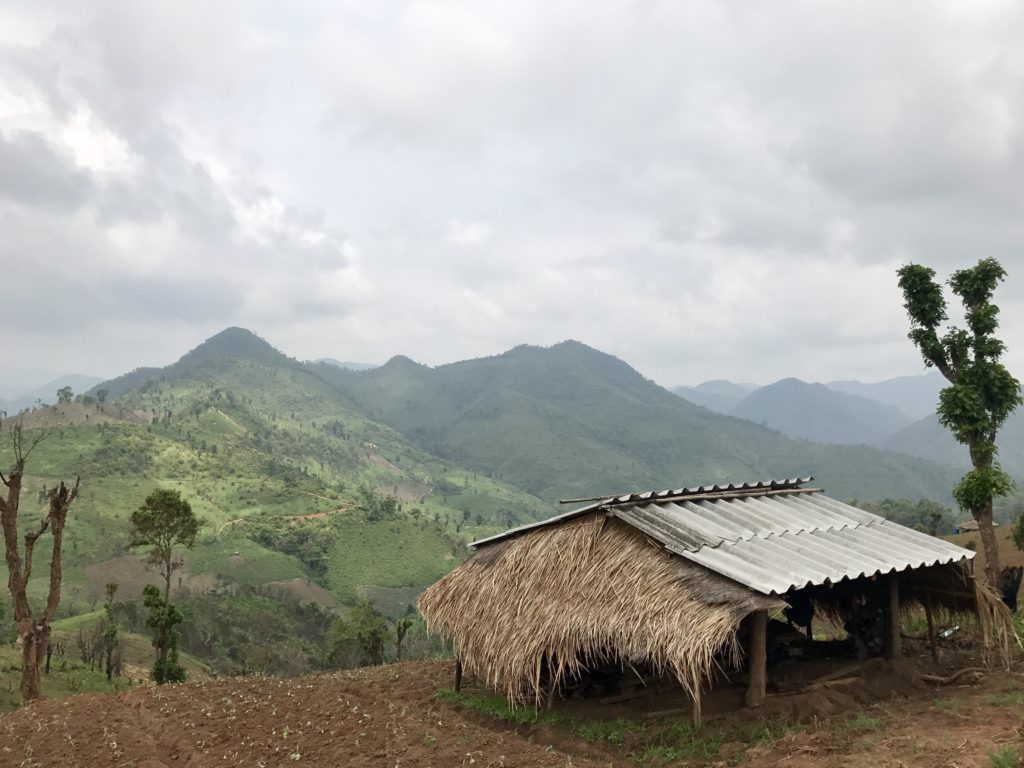
Hills of Mae Sariang, Thailand
In the hills of Northwest Thailand near Mae Sariang, the morning fog rolls through lush forest and over corrugated and thatched roofs, touching cultivated mountain rice fields and retreating by midmorning into blue skies. The Karen tribesmen inhabit these hills, practicing subsistence agriculture and living in semi-isolation from Thai society. Only 200km to the south are the tragic refugee camps full of Karen and other ethnic minorities fleeing from Myanmar’s civil war, but here the dawn is apparently peaceful.
I joined a jungle backpacking trek near the Thai-Burmese border with a homestay in a Karen village. We departed out of Chiang Mai with a Karen guide from the Eco Pooh trek company. There were two others, my friend R Ninan and a French expat from Bangkok.
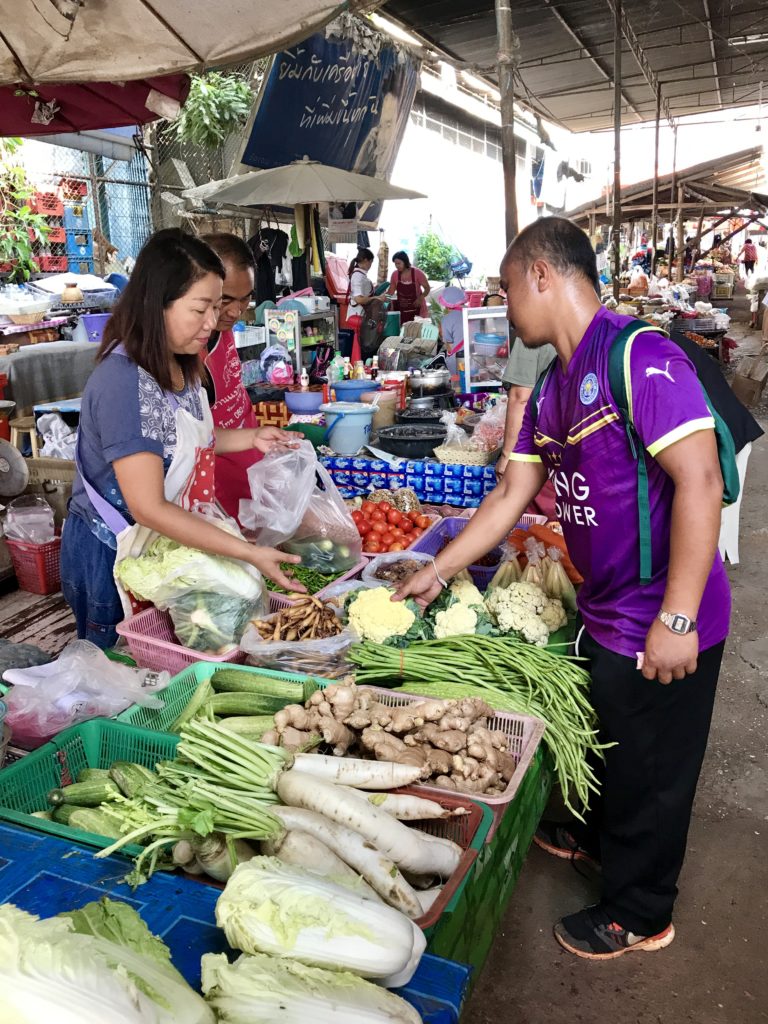
Guide Buying Cauliflower at the Market — R Ninan
We stopped at a market en route for local produce to cook on the trek. Simple fan motors with plastic bags tied to them kept flies off meat products. It was the start of mango and durian season, and I am off-camera feasting on mangoes while the guide purchased our veggies.
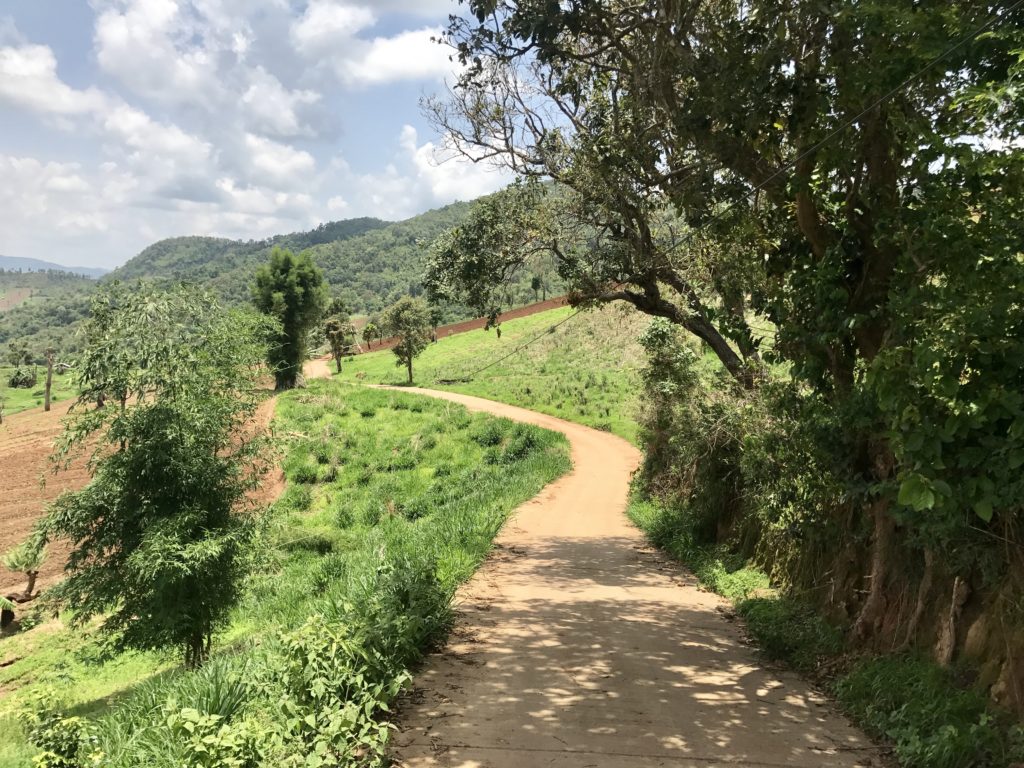
Starting the Trek
We drove for roughly 2 hours, past a police checkpoint and several larger-than-life visages of the recently deceased King, stopping at a roadside stand to switch from our van to a pickup truck.
We were planning to leave some luggage in the van and asked, “What does the driver do for the 3 days we are gone?”
“He close eyes. He open eyes,” replied our expressionless guide.
We buried our bags between the van seats and rode an hour in the back of the pickup before starting our trek on a dusty paved road through hilly fields. It was in the 90’s F with humidity 50%+, and we were quickly soaked.
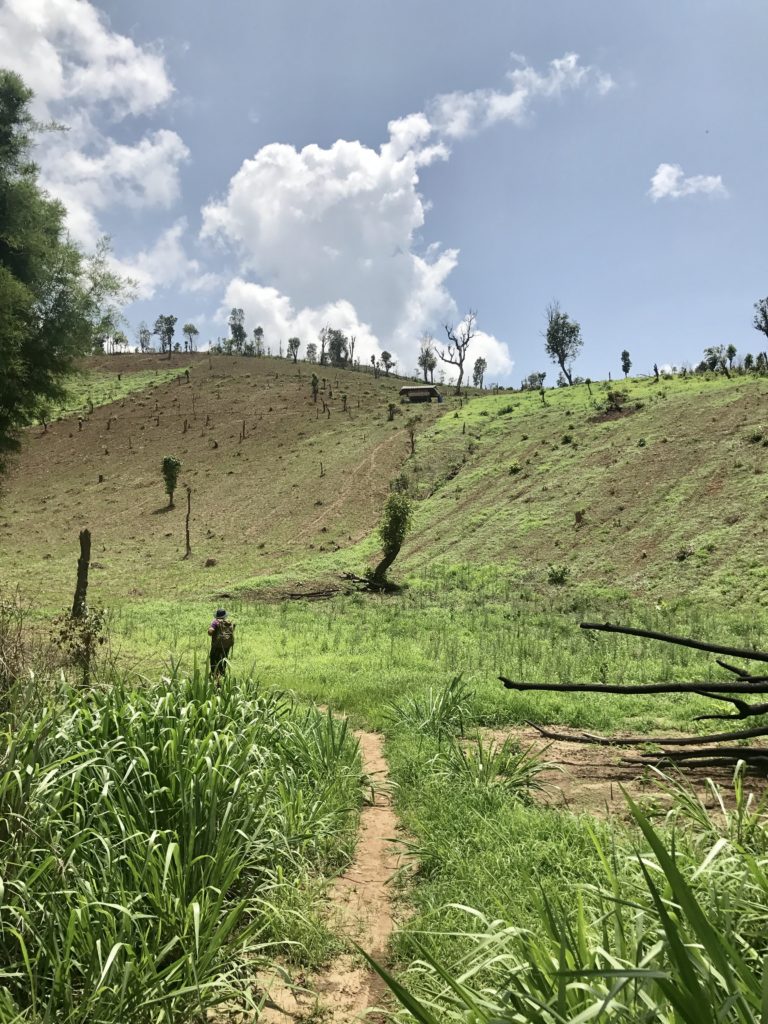
Deforested Hillside
An abrupt change in scenery to deforested slopes spotted with shrubs and stilted houses appeared almost comical, like a scene out of Dr. Seuss’s The Lorax. Slash and burn is a traditional agricultural practice among Thailand’s hill tribes, resulting in deforestation. The Karen keep the soil erosion impact to a minimum by methods of crop rotation, systematic weeding, and fire control.
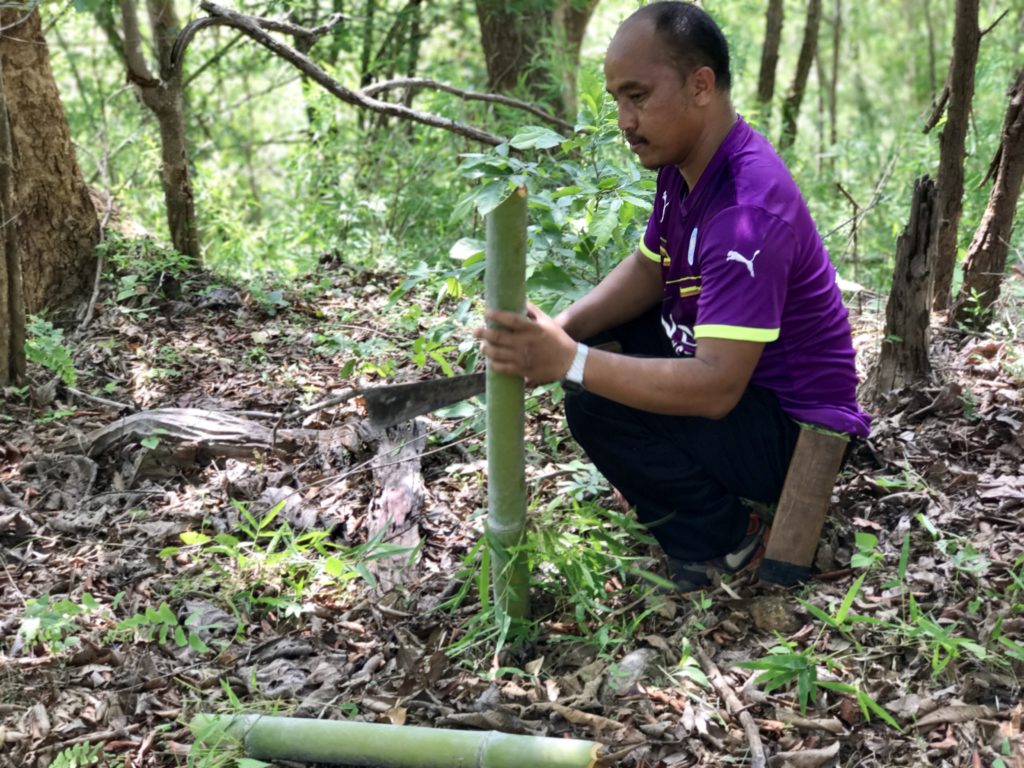
Machete Cutting Bamboo — R Ninan
A machete was our all-purpose survival tool and bamboo our all-purpose medium. Our cutlery was fashioned from bamboo — tea cups, bowls, spoons, chopsticks, and even cooking pots. The separate chambers in the stalk are watertight, and local fisherman even use them to store their catch.
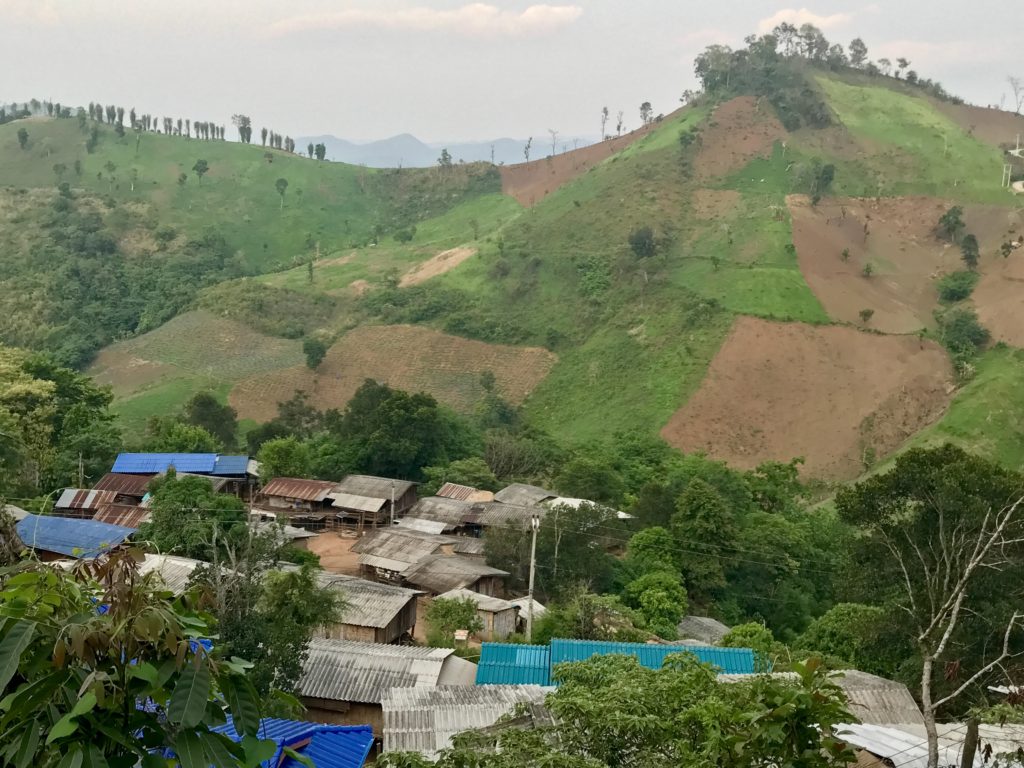
Karen Hill Tribe Village
After much upward climb, we reached the first village, a motley patchwork valley of corrugated-roof houses mirroring the geometry of the farmland patchwork above.
Our guide had unfortunately underestimated the amount of water needed and asked us to carry two 0.6L bottles each while we could have easily consumed two 1.5L bottles. I learned a survival lesson — to always make the decision myself on the minimum quantity of water needed based on questions regarding length of trek and elevation gain, water availability, the weather temp and humidity, etc
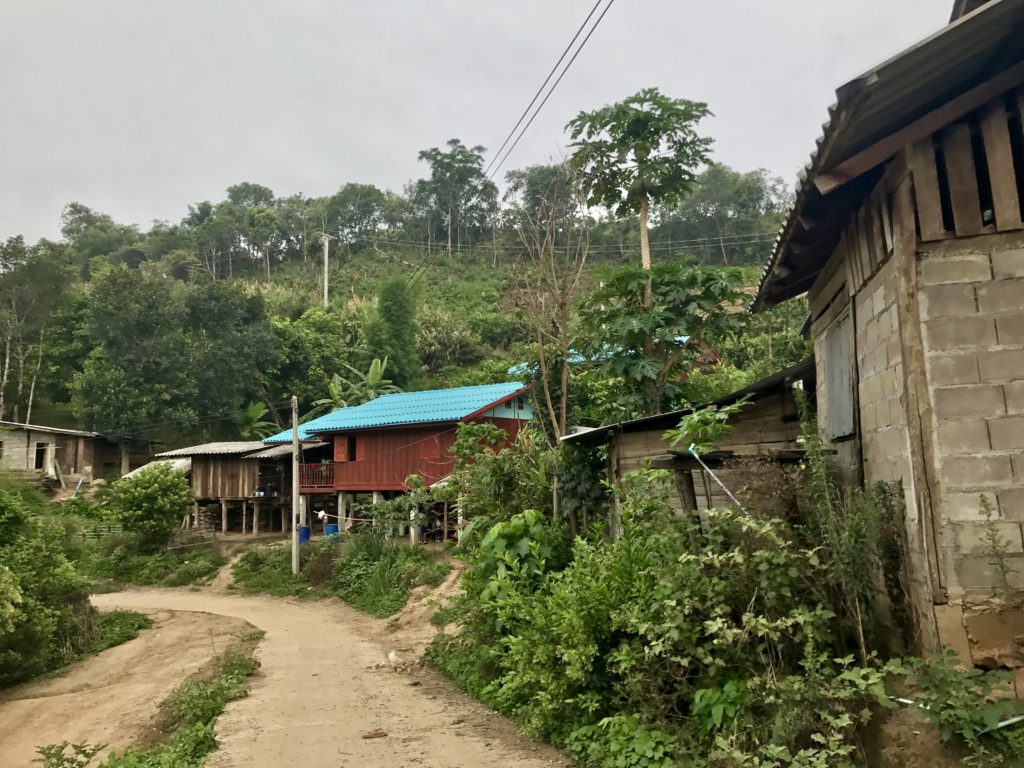
Main Road Through Village
All villages in Thailand are now accessible by road or tracks and have either electricity lines or solar. Stilted houses of painted and unpainted teak and bamboo are aligned along a central dirt road.
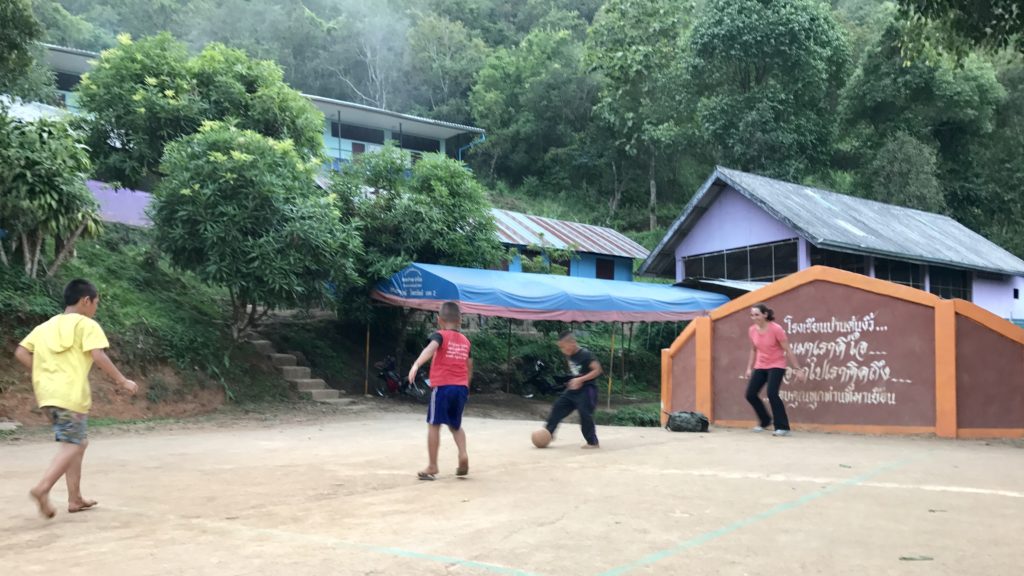
Soccer Match — R Ninan
Shy groups of village kids dared each other to pass nearest to us. Some schoolkids invited us to join their soccer game. Dehydrated as we were, there was a thrill in playing something as universal as soccer in a village where we didn’t speak the language. They could say hello and goodbye. We gave them high fives when they scored goals and were relieved when the ball was kicked over an escarpment so that we could move on and find bottled water.
The Thai government set up schools in all villages to teach reading and writing Thai, mathematics, environmental resource management, and preserving ethnic traditions. Today, over 90% of hill tribes speak Thai.
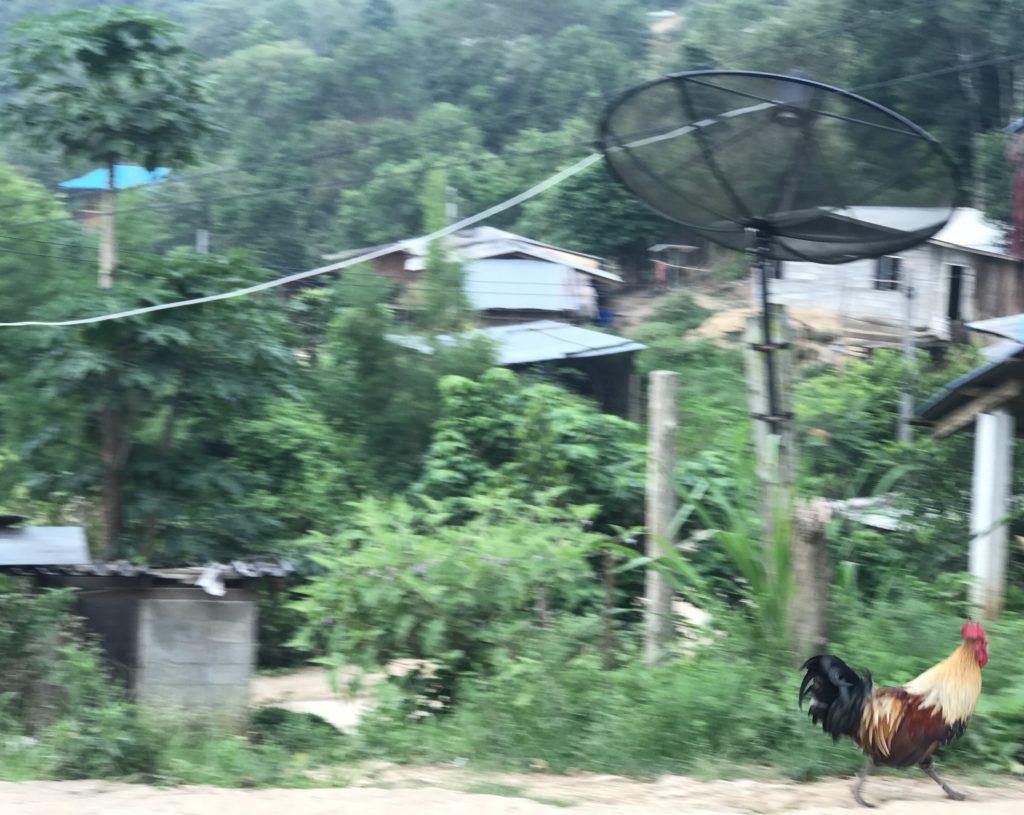
iPhone 7+ Profile Pic of a Rooster
This majestic rooster was taking its own trek through the village.
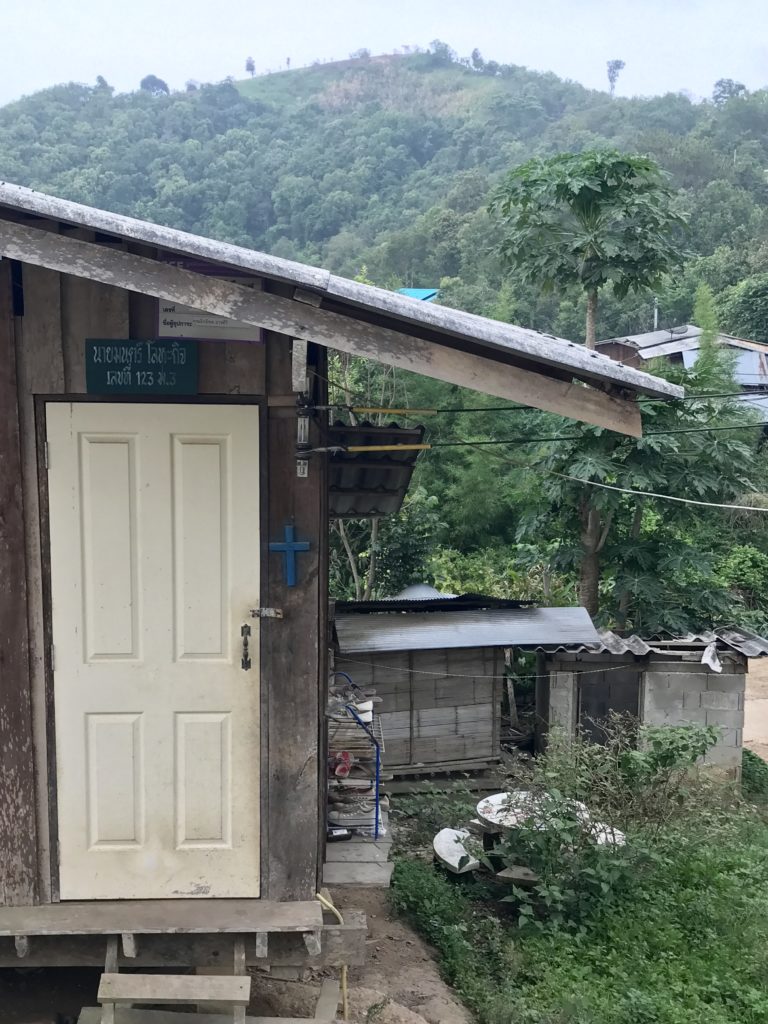
Christianity in the Village
The blue cross by the door signifies that Christian missionaries visited the village in the 20th century.
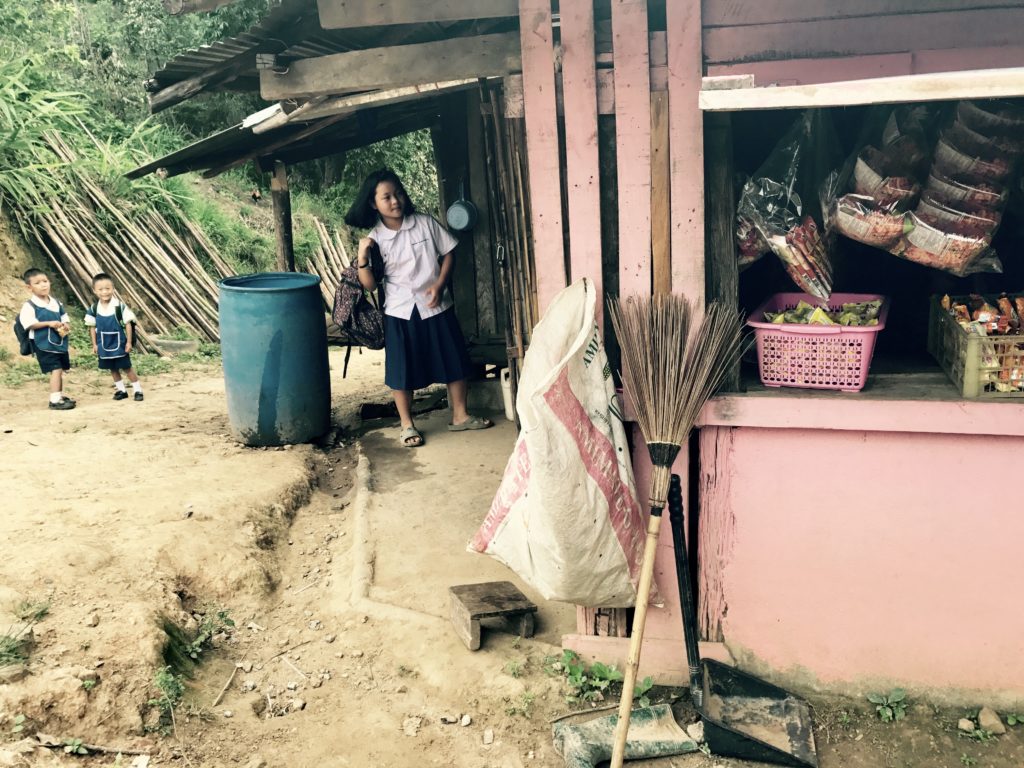
Village Store — R Ninan
The village has only one store where the Karen can buy snacks and any goods from the outside world. Sadly, there’s a hillside on the village outskirts of discarded plastic trash. The Karen had traditionally disposed of bamboo implements anywhere, and they treat plastic the same way. Seeing the store and trash raised ethical discussions on poverty within our group — whether to define the standard of living economically or not, what is the need for money in a community with self-sufficient farming, and the importance of preserving tradition but at what cost to livelihood.
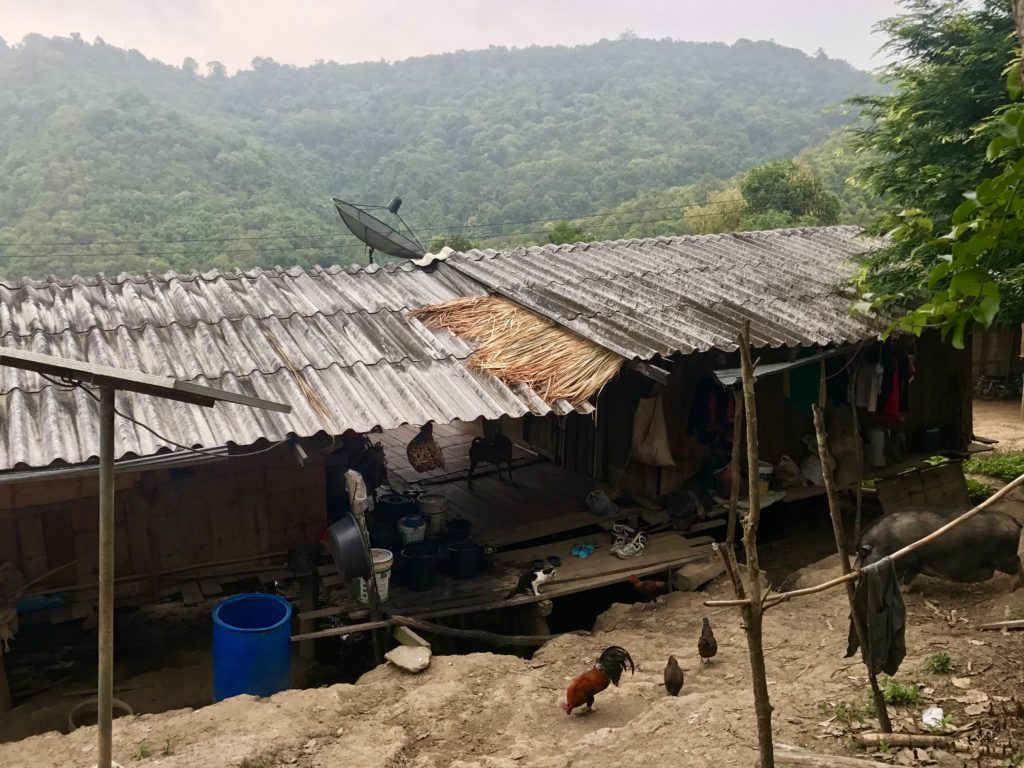
Karen Hill Tribe Household
We home stayed with a family living in a wooden stilted house with chickens and an enormous pig leisurely roaming about. There was no running water, only buckets carried from a low-waterline well at the town’s base that supported 300 people. Depending on the time of year, the well was often insufficient in its resource, and villagers got their water from food instead of drink.
A central breezeway separated the main living quarters with a tiered firepit on the left from the secondary living quarters on the right they allocated for us “white people.” We slept on bamboo mats on the teak-planked floor, covered by mosquito nets, and the roosters and other animals were free to walk underneath and crow to their heart’s pleasure through the night.
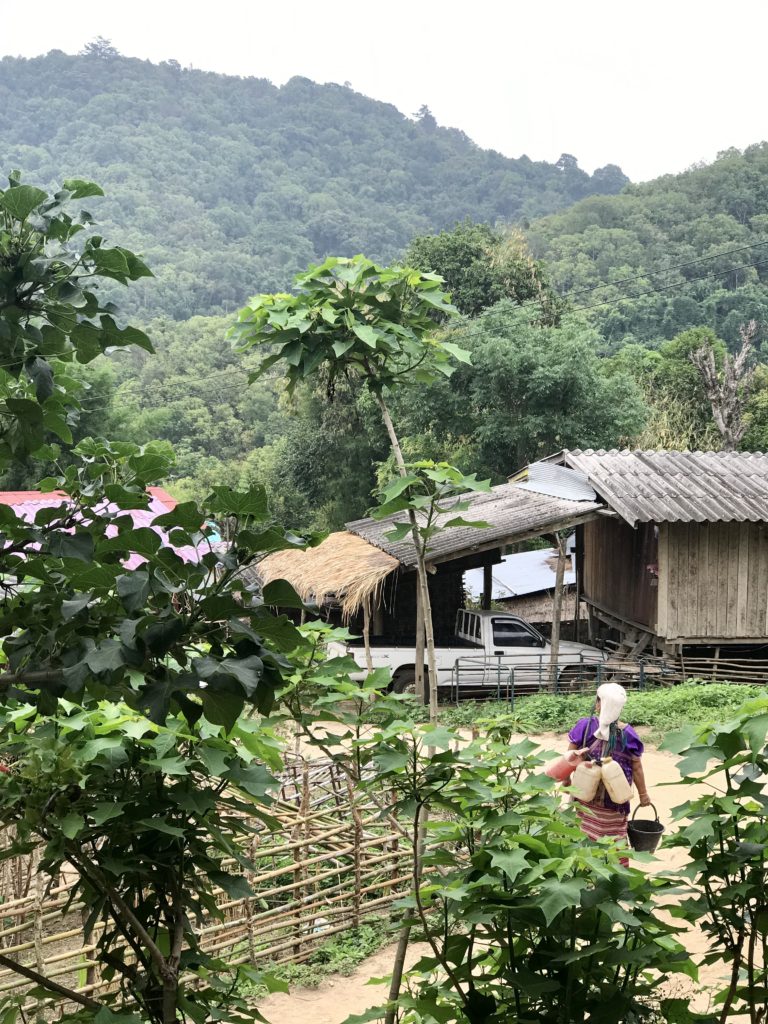
Village Woman in Cloth Turban
The Karen matriarch at our homestay wore a cloth turban that commanded authority as she walked with purpose or stood with feet planted wide, arms occupied with chores or decisively hanging by her side, observing the family and us with serious expression. The Karen are matriarchal and matrilineal with women controlling the family finances and passing the family line.
I was pleased to see both genders partaking equally in the vices of drinking and smoking. When I inquired who does the cooking, our guide translated, “whoever is less tired cooks.”
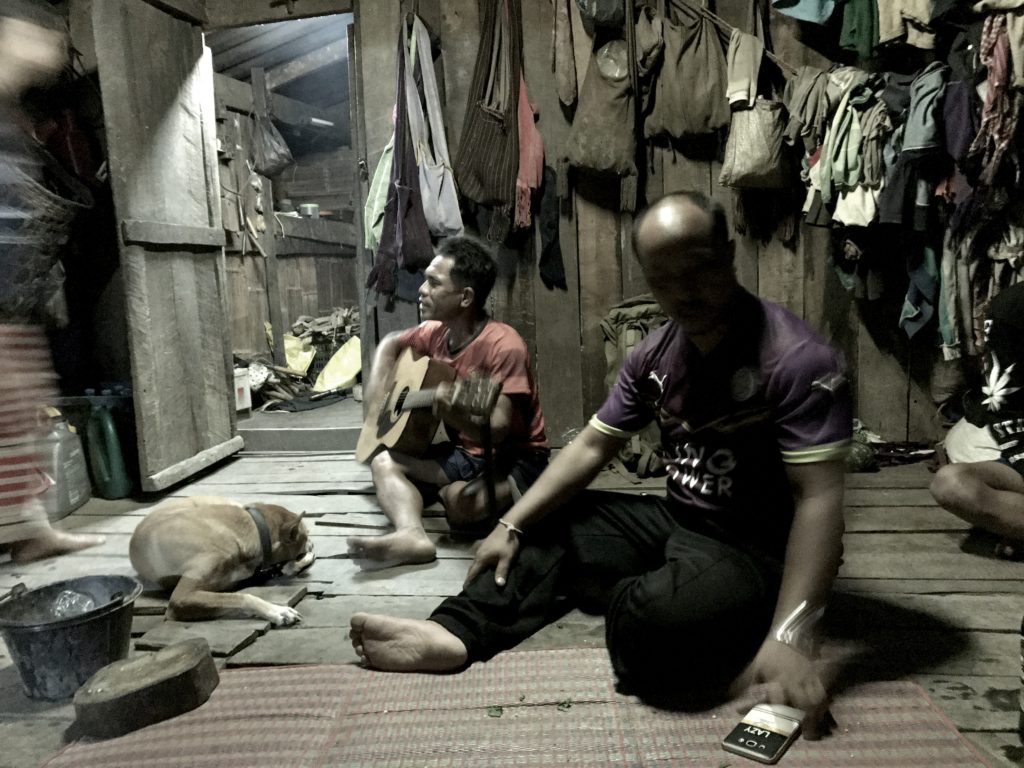
Evening Entertainment With a 5-Stringed Guitar — R Ninan
After a dinner of potato and pork stew and vegetable and tofu stir fry with rice and pineapple, we drank warm freshly-distilled rice whisky on the breezeway with our homestay’s family and friends. They entertained each other with jokes and magic tricks on a closed-looped string. Hanging on the rear wall are the bags they take to work in the rice fields.
The guide translated that the villagers were talking happily about the present, not about future wants or planning — both a formula for contentedness and short-sightedness. Some younger members watched Thai videos on smartphones.
The village had one communal guitar, but it was missing a string. The man in the red jersey sang folk songs and managed to strike bar chords far better than I did without the high E.
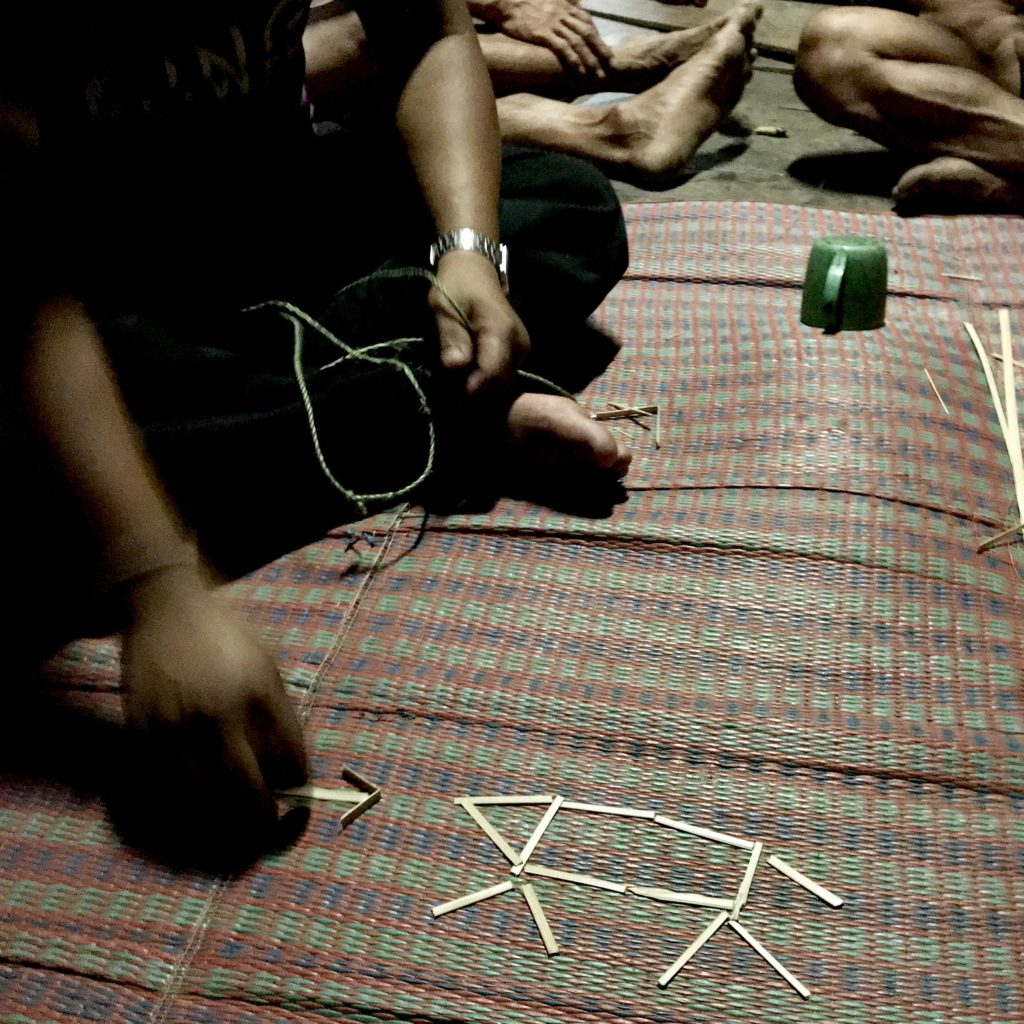
Matchstick Pig and Arrow Puzzle — R Ninan
The guide kept us entertained with matchstick games on a bamboo mat. Here’s a puzzle – an arrow is headed to kill a pig. Move three 3 pieces (not including the arrow) to save the pig. And no, the answer isn’t turn the other way and let the pig get hit in the behind.
While we were stumped on this puzzle, our French colleague asked “Does this tribe have that tradition of lining up the women and the men choose their bride?”
“No no, that’s not us. We have Facebook,” our guide replied defensively.
